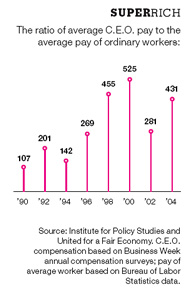| Want to send this page or a link to a friend? Click on mail at the top of this window. |
More Special Reports |
| Posted April 17, 2006 |
 |
Photograph by Mark Peterson |
| Way Upstairs, Downstairs |
| The gap between the rich and the rest of us has grown wider. And we can't talk about it. By Walter Kim |
T here are studies that prove it, but I don't need to read them. I've seen the prices on the menus. I've also seen the pay stubs of the cooks. I've stood in the mansions, let in by the maids, and listened to the string quartets, whose players I've met in the coat aisle at Goodwill. I know what's going on. As predicted, but much faster than anticipated, the rich in America are getting richer (at rates that favor the very rich and the superrich). And at the same time, as wasn't quite predicted but still seems faster than anticipated, the nonrich are getting almost nowhere.
What I didn't know was that my knowledge shouldn't bother me.
Not according to John Snow, still, at this writing, secretary of the U.S. Treasury, who nonchalantly told a journalist recently."What's been happening in the United States for about 20 years is" a "long-term trend to differentiate compensation." "Long-term," when used this way by this sort of official, tends to mean "fundamentally unstoppable." And, in this case, inexplicable, like a sort of financial global-warming process that may be man-made or (who knows?) a natural cycle that we would welcome if only we knew its function. Snow, a trained economist and former corporate C.E.O., doesn't pretend to be able to explain what's causing this whole compensation differential. Nor does he seem tortured by his ignorance. "We've moved into a star system for some reason," he said, "which is not fully understood."
As a nonrich noneconomist, I don't know why what's happening is happening either. But I can remember when it wasn't happening, at least not so rapidly and spectacularly. Time: The 1970's. Place: The countryside north of Minneapolis. I'm attending public grade school and junior high, watching what little TV there was to watch then and bumping into rich folks on occasion. At school, in my social-studies classes, I'm learning about a condition known as "poverty," which mainly exists, my textbooks indicate, in two obscure locations: "Appalachia" and "the ghetto." (It's a terrible situation, but it's improving some.) From television, on "Gilligan's Island," I'm learning about tycoons. (They wear blazers and speak in nasal voices.) And from actual rich people, whom I know are rich because I've heard my parents whisper about them, I'm learning that having lots of money means driving renamed Fords and Chevys called Lincolns and Cadillacs. They possess more leg room than Fords and Chevys, but mechanically they're the same, my father says.
 |
Such innocence. Such miniature wisdom. Poverty: Bad, related to geography and something we're rightly trying to end. Tycoons: A ridiculous species of the rich. The rich: What Lincolns are to Fords. Conclusion: We're all Americans, mechanically.
But then came the dawning of the long-term star system, a phenomenon so extensive and mysterious (even to educated Treasury secretaries) that I sense it may soon become immune to human cognition in the manner of the vastest things. Gravity. Time. The national debt.
It doesn't help that the vocabulary of wealth and poverty hasn't been adjusted for inflation since the heyday of dimwitted 1960's TV comedy. We still call the very rich among us millionaires, even though lots of them are closer to billionaires. Words fail reality at the other end too. In 1974, I knew exactly what the grown-ups meant when they called a person "poor." They meant he could barely feed or clothe himself. Today that's still what I think poor means, but to friends of mine in their 20's and early 30's, it seems to mean something more like "short on cash." Their favored terms for passers-by who appear to be living on the edge are "practically homeless," "doomed" and, sometimes, "psycho" — words that refer less to having less than to somehow being less. The condition once described by "poor" — having nothing in a chronic fashion and not because of a temporary money crunch caused by lavish spending; and having nothing for many possible reasons, but not necessarily or chiefly because the person is damned or insane or a social untouchable — has been orphaned by ordinary speech. It's a simple idea without a simple word now.
Meanwhile, the nonsimple words are taking over. The words with 11 bedrooms and 7 baths that are larger and finer than rich folks needed before the "differentiation" — which isn't merely an economic trend but a style, an aesthetic. "Since the early 1980's on," Secretary Snow said, "we've seen a rise in inequality, but we've also seen parallel to that a continuous rise in living standards." To know what he means, you would have to read the studies, but to know how he feels, you just have to hear his diction.
To my ear, the man sounds satisfied. And convinced that his listeners should be satisfied too.
But my ears are small, predifferentiation ears, their canals wide enough for only simple words and simple ideas. "Rich." "Poor." "Unfair." My eyes have a similar limitation. I see a person wearing jeans, and I can't imagine that he's a millionaire. I see a person I'm told is worth a billion and wonder why he's not wearing a tie. I see his Bentley and mistake it for a Lincoln, which is really just a Ford, and then out of that Ford steps a major movie star. I see a Cadillac, and I find out that it belongs to an immigrant gypsy-cab driver who shares it with his two brothers-in-law and parks it in the garage where all of them live.
The Treasury secretary may have a point, though. It's all mysterious.
In the limited sense of confusing, it sure is. But on "Gilligan's Island," if the Skipper or the Professor deemed some occurrence "mysterious," what I remember him doing next was to quiver and then run off and warn the others.
Walter Kirn, a frequent contributor, is the author, most recently, of "Mission to America," a novel.
Copyright 2006 The New York Times Company. Reprinted from The New York Times of Sunday, April 16, 2006.
| Wehaitians.com, the scholarly journal of democracy and human rights |
| More from wehaitians.com |